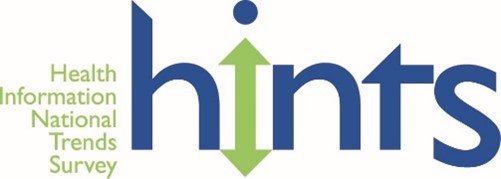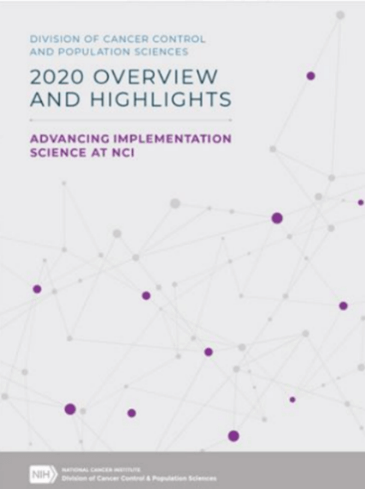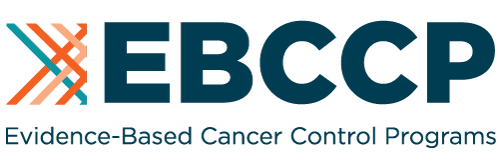Dear Colleagues,

March marked the one-year anniversary of the WHO declaration of the COVID-19 pandemic. Life as we knew it was forever altered and one year plus later, we continue to strive for some sort of return to normalcy. The past year has showcased the tremendous strength and resilience of our research community. We have faced innumerable challenges by collaborating and innovating in ways unimaginable just a year ago. Because of your continued dedication, we are advancing important research to drive new discoveries in cancer prevention and control. This is an exciting time in cancer research as we commemorate the 50th anniversary of the National Cancer Act of 1971. The signing of the National Cancer Act established a nationally coordinated approach to cancer research. NCI Director Dr. Ned Sharpless discusses the commemoration in this Cancer Currents blog post. We also are celebrating the 25th anniversary of the Office of Cancer Survivorship.
NIH remains involved in many COVID-related initiatives. For example, this NCI press release discusses a large pilot study examining risk of future infection among patients with SARS-CoV-2 antibodies using claims data.
Below, we highlight findings from BRP-supported or BRP-funded projects in journals and in the media. For example, read about a pragmatic measure of park access and use, the implications of COVID-19 and social distancing on cancer control, characteristics of US adult cigarette smokers who recently quit smoking, and barriers to accessing online medical records in the US. You’ll find a few new resources, including a new HINTS 5, Cycle 4 dataset featuring items assessing awareness of and experience with genetic testing and clinical trials, and opinions about communication-related public health efforts. We encourage you to mark your calendars for some interesting virtual events scheduled in the coming months, including a data user webinar series to help early-stage tobacco use investigators effectively leverage the Tobacco Use Supplement to the US Census Bureau’s Current Population Survey in their research. Finally, we welcome four new staff members to BRP: Dr. Nicole Senft Everson, a Program Director in the Health Communication and Informatics Research Branch; Dr. Joe Ciccolo, a Program Director in the Tobacco Control Research Branch; Dr. David (Chipper) Dean, a Program Director in the Health Behaviors Research Branch; and Dr. Paul Han, a Senior Scientist in the Office of the Associate Director.
As a reminder, you’re free to manage your BRP newsletter subscription at any time, but we hope you find the information beneficial. If you’re on social media, make sure to follow us on Twitter at @NCIBehaviors ![]() .
.
Warmly,
Bill Klein, Associate Director
New Funding Opportunities
Exercise and Nutrition Interventions to Improve Cancer Treatment-Related Outcomes (ENICTO) in Cancer Survivors Consortium (U01 Clinical Trial Required)
RFA-CA-21-031
Contact: Dr. Frank Perna
Posted: May 3, 2021
Expires: July 15, 2021
Coordinating Center for Exercise and Nutrition Interventions to Improve Cancer Treatment-Related Outcomes (ENICTO) in Cancer Survivors Consortium (U24 Clinical Trial Not Allowed)
RFA-CA-21-032
Contact: Dr. Frank Perna
Posted: May 3, 2021
Expires: July 15, 2021
Centers on Telehealth Research for Cancer-Related Care (P50 Clinical Trial Required)
RFA-CA-21-029
NCI Contacts: Dr. Robin Vanderpool and Dr. Roxanne Jensen
Posted: April 8, 2021
First Available Due Date: July 20, 2021
Expires: July 21, 2021
Notices of Special Interest (NOSIs)
Administrative Supplements to Stimulate and Strengthen Global Cancer Survivorship Research
NOT-CA-21-058
NCI Contact: Dr. Sudha Sivaram
Posted: April 23, 2021
First Available Due Date: June 11, 2021
Expires: June 12, 2021
Understanding the Effects of Cancer and Cancer Treatment on Aging Trajectories and Aging Outcomes
NOT-CA-21-031
NCI Contact: Dr. Lisa Gallicchio
Posted: January 27, 2021
First Available Due Date: March 8, 2021
Expires: January 8, 2024
Developing and Testing Multilevel Physical Activity Interventions to Improve Health and Well-Being
NOT-OD-21-087
NCI Contact: Dr. Frank Perna
Posted: April 6, 2021
First Available Due Date: June 05, 2021
Expires: February 16, 2024
Telehealth in Cancer Care
NOT-CA-21-043
NCI Contacts: Dr. Kelly Blake and Dr. Gurvaneet Randhawa
Posted: April 14, 2021
First Available Due Date: June 05, 2021
Expires: March 08, 2024
Register for the webinar >>![]()
Promoting Research on Interoception and Its Impact on Health and Disease
NOT-AT-21-002
NCI Contact: Dr. Todd Horowitz
Posted: January 22, 2021
First Available Due Date: February 25, 2021
Expires: May 7, 2024
Using Systems Science Methodologies to Protect and Improve Child and Reproductive Population Health
NOT-HD-20-032
NCI Contacts: Dr. David Berrigan and Dr. Marissa Shams-White
Posted: March 10, 2021
First Available Due Date: June 5, 2021
Expires: May 8, 2024
Improving Patient Adherence to Treatment and Prevention Regimens to Promote Health
NOT-OD-21-100
NCI Contact: Dr. Wendy Nelson
Posted: April 8, 2021
First Available Due Date: May 7, 2021
Expires: June 8, 2024
Reissuances
Tobacco Regulatory Science (R01 Clinical Trial Optional)
RFA-OD-21-002
NCI Contact: Dr. Rachel Grana Mayne
Posted: February 17, 2021
First Available Due Date: July 14, 2021
Expires: February 15, 2023
Modular R01s in Cancer Control and Population Sciences (R01 Clinical Trial Optional)
PAR-21-190
NCI Contact: Mr. Scott Rogers
Posted: March 12, 2021
First Available Due Date: November 8, 2021
Expires: March 8, 2024
Secondary Analyses of Existing Datasets of Tobacco Use and Health (R21 Clinical Trial Not Allowed)
RFA-OD-21-003
NCI Contact: Dr. Rachel Grana Mayne
Posted: March 10, 2021
First Available Due Date: October 8, 2021
Expires: March 9, 2023
Maximizing the Scientific Value of Existing Biospecimen Collections (R21 Clinical Trial Not Allowed)
RFA-OD-21-004
NCI Contact: Dr. Rachel Grana Mayne
Posted: March 10, 2021
First Available Due Date: October 8, 2021
Expires: March 9, 2023
COVID-19 Resources and Information
Combat COVID website
The US Department of Health and Human Services (HHS), in coordination with NIH and Operation Warp Speed, launched a website called Combat COVID, available in English and Spanish. This portal helps people to reach informed decisions about their health and find out how to help in the fight against COVID-19 through volunteer opportunities. Learn about Combat COVID >>
Implications of social distancing and COVID-19 on cancer control
A recent commentary discusses how the COVID-19 pandemic has changed patterns of social interaction. Authors argue that shifts in social interactions may play a unique role in health behaviors and decision-making that are necessary for effective cancer prevention and control. Social distancing may influence cancer outcomes through cancer-related health behaviors (e.g., smoking, alcohol consumption, eating, activity, sedentariness), which are often influenced by social relationships. Additionally, social distancing may also affect the dynamics of patients’ relationships with their healthcare professionals and caregivers. The paper was co-authored by BRP Program Directors Dr. Rebecca Ferrer and Dr. Tanya Agurs-Collins and BRP fellow Dr. Amanda Acevedo.
Ferrer, R.A., Acevedo, A.M., Agurs-Collins, T.D. COVID-19 and social distancing efforts-implications for cancer control. JAMA Oncol. 2021 Apr 1;7(4):503-504.
Staffing News

Dr. Nicole Senft Everson joined the BRP Health Communication and Informatics Research Branch as a Program Director. Her research focuses on person-centered interpersonal and technology-mediated communication across the cancer continuum. She also is interested in how interpersonal health communication impacts, and is affected by, health technologies. Her research has examined patient-provider communication in the contexts of cancer diagnosis, treatment decision-making, tobacco cessation treatment, and cost conversations, with an emphasis on the role of affective behavior. Dr. Senft Everson received her Ph.D. from Georgetown University's Department of Psychology. She has a B.A. from Marquette University in psychology and Spanish language and literature.

Dr. Joseph T. Ciccolo is a Program Director in BRP’s Tobacco Control Research Branch. Prior to joining NCI, Dr. Ciccolo was the Principal Investigator of multiple NIH-funded clinical trials, and an Assistant Professor in the Department of Biobehavioral Sciences at Teachers College, Columbia University. His primary research interests are broadly focused on the efficacy of novel clinical treatments for addiction and mental illness. His specific area of interest has been cigarette smoking cessation in high-risk and hard-to-reach populations. Dr. Ciccolo received his Ph.D. from The University of Texas at Austin, and he completed an NIH-funded T32 postdoctoral fellowship at the Alpert Medical School of Brown University.

Dr. David Dean Jr. (Chipper) recently joined BRP as a Program Director in the Health Behaviors Research Branch. Chipper is a developmental-health psychologist with interests in the psychological and determinants of health risk, protective behavior, and behavioral health. Prior to joining NCI, Dr. Dean conducted behavioral health and child development research. He also served as a behavioral research scientist and Chief of the Analysis and Services Research Branch at the Substance Abuse and Mental Health Administration, where he directed a national registry of evidence-based programs and practices and managed a research portfolio on behavioral health. Dr. Dean earned his Ph.D. in educational psychology at Columbia University, and he completed an NIH postdoctoral fellowship in psychology and public health at the University of Washington. He has a M.S. in mental health counseling and B.S. in psychology from Stetson University.

Dr. Paul Han joined the BRP Office of the Associate Director as a Senior Scientist. In addition to this role, he serves as an adjunct investigator in NCI's Clinical Genetics Branch in the Division of Cancer Epidemiology and Genetics. Prior to joining NCI, Dr. Han served as the Director of the Center for Outcomes Research and Evaluation CORE at the Maine Medical Center Research Institute, and Associate Professor of Medicine at the Tufts University School of Medicine. His research program focuses on understanding and improving the communication and management of uncertainty in health care, and his work bridges the disciplines of behavioral and health services research. His specific interests include risk communication, shared decision making, and predictive modeling, and his research has examined clinical problems in cancer care, genomic medicine, and palliative and end-of-life care. Dr. Han earned his M.D. from the New York University School of Medicine, and an M.A. in bioethics and an M.P.H. from the University of Pittsburgh. He completed Internal Medicine residency training at the University of California, Los Angeles, and an NCI Cancer Prevention Fellowship in BRP.
Scientific Advances
What follows are highlights of publications from research supported by BRP:
Bower, J.E., Ganz, P.A., Irwin, M.R., Cole, S.W., Garet, D., Petersen, L., Asher, A., Hurvitz, S.A., Crespi, C.M. Do all patients with cancer experience fatigue? A longitudinal study of fatigue trajectories in women with breast cancer. Cancer. 2021 Apr 15;127(8):1334-1344.
Chen, W.G., Schloesser, D., Arensdorf, A.M., Simmons, J.M., Cui, C., Valentino, R., Gnadt, J.W., Nielsen, L., Hillaire-Clarke, C.S., Spruance, V., Horowitz, T.S., Vallejo, Y.F., Langevin, H.M. The emerging science of interoception: Sensing, integrating, interpreting, and regulating signals within the self. Trends Neurosci. 2021 Jan;44(1):3-16.
Coletta, A.M., Rose, N.B., Johnson, A.F., Moxon, D.S., Trapp, S.K., Walker, D., White, S., Ulrich, C.M., Agarwal, N., Oza, S., Zingg, R.W., Hansen, P.A. The impact of a hospital-based exercise oncology program on cancer treatment-related side effects among rural cancer survivors. Support Care Cancer. 2021 Jan 27:1–10.
Dahne, J., Tomko, R.L., McClure, E.A., Obeid, J.S., Carpenter, M.J. Remote methods for conducting tobacco-focused clinical trials. Nicotine Tob Res. 2020 Dec 12;22(12):2134-2140.
Gallicchio, L., Tonorezos, E., de Moor, J.S., Elena, J., Farrell, M., Green, P., Mitchell, S.A., Mollica, M.A., Perna, F., Gottlieb Saiontz, N., Zhu, L., Rowland, J., Mayer, D.K. Evidence gaps in cancer survivorship care: A report from the 2019 National Cancer Institute cancer survivorship workshop. J Natl Cancer Inst. 2021 Mar 23:djab049. Epub ahead of print.
Guida, J.L., Alfini, A.J., Gallicchio, L., Spira, A.P., Caporaso, N.E., Green, P.A. Association of objectively measured sleep with frailty and 5-year mortality in community-dwelling older adults. Sleep. 2021 Jan 6:zsab003.
Hall, K.L. Forging forward together: Transforming scientific practice to accelerate scientific progress. Ann Behav Med. 2020 Dec 1;54(12):968-977.
Hamel, L.M., Moulder, R., Harper, F.W.K., Penner, L.A., Albrecht, T.L., Eggly, S. Examining the dynamic nature of nonverbal communication between Black patients with cancer and their oncologists. Cancer. 2021 Apr 1;127(7):1080-1090.
Hesse, B.W., Conroy, D.E., Kwaśnicka, D., Waring, M.E., Hekler, E., Andrus, S., Tercyak, K.P., King, A.C., Diefenbach, M.A. We're all in this together: Recommendations from the Society of Behavioral Medicine's Open Science Working Group. Transl Behav Med. 2021 Apr 7;11(3):693-698.
Kaczynski, A.T., Hughey, S.M., Stowe, E.W., Wende, M.E., Hipp, J.A., Oliphant, E.L., Schipperijn, J. ParkIndex: Validation and application of a pragmatic measure of park access and use. Prev Med Rep. 2020 Oct 3;20:101218.
Kang, Y., Falk, E.B. Neural mechanisms of attitude change toward stigmatized individuals: Temporoparietal junction activity predicts bias reduction. Mindfulness (N Y). 2020 Jun;11(6):1378-1389.
Liu, B., Dompreh, I., Hartman, A.M. Small area estimation of smoke-free workplace polices and home rules in U.S. counties. Nicotine Tob Res. 2021 Feb 3:ntab015.
Mollica, M.A., Chou, W.S., Tonorezos, E.S., Smith, A.W. Young adult caregivers' perceptions of cancer misinformation on social media: Response to Warner et al. Cancer. 2021 Apr 15;127(8):1177-1179.
O'Connor, S.G., Boyd, P., Bailey, C.P., Shams-White, M.M., Agurs-Collins, T., Hall, K., Reedy, J., Sauter, E.R., Czajkowski, S.M. Perspective: Time-restricted eating compared with caloric restriction: Potential facilitators and barriers of long-term weight loss maintenance. Adv Nutr. 2021 Mar 31;12(2):325-333.
Prutzman, Y.M., Wiseman, K.P., Grady, M.A., Budenz, A., Grenen, E.G., Vercammen, L.K., Keefe, B.P., Bloch, M.H. Using digital technologies to reach tobacco users who want to quit: Evidence from the National Cancer Institute's Smokefree.gov Initiative. Am J Prev Med. 2021 Mar;60(3 Suppl 2):S172-S184.
Rosoff-Verbit, Z., Logue-Chamberlain, E., Fishman, J., Audrain-McGovern, J., Hawk, L., Mahoney, M., Mazur, A., Ashare, R. The perceived impact of COVID-19 among treatment-seeking smokers: A mixed methods approach. Int J Environ Res Public Health. 2021 Jan 9;18(2):E505.
Trivedi, N., Patel, V., Johnson, C., Chou, W.S. Barriers to accessing online medical records in the United States. Am J Manag Care. 2021 Jan;27(1):33-40.
Verdecias, N., Garg, R., Steensma, J., McQueen, A., Greer, R., Kreuter, M.W. Expressed and unexpressed social needs in low-income adults in the U.S. Health Soc Care Community. 2020 Dec 30. Epub ahead of print.
Walton, K., Wang, T.W., Prutzman, Y., Jamal, A., Babb, S.D. Characteristics and correlates of recent successful cessation among adult cigarette smokers, United States, 2018. Prev Chronic Dis. 2020 Dec 10;17:E154.
Training
Health Communication Fellowship in Behavioral Research
BRP welcomes applications from qualified candidates for a Cancer Research Training Award (CRTA) fellowship in applied health communication. The fellow will work on a variety of communication projects to support behavioral cancer prevention and control research across the four branches of the program. Specific duties include writing and editing content for multiple communication channels including scientific newsletters, social media, and website; designing visual elements; coordinating webinars, scientific meetings, and special events; and serving as project manager to support various initiatives.
Resources
New HINTS data now available
The Health Information National Trends Survey (HINTS) latest public use dataset, HINTS 5, Cycle 4 (2020), is now available for download in SAS, SPSS, or STATA formats. The dataset included new questions to assess people’s awareness of and experience with genetic testing and clinical trials, and their support for or opposition to communication-related public health efforts such as product advertising restrictions and warning labels. Access the HINTS 5, Cycle 4 dataset >>
New website features medical image perception research studies
BRP recently launched a webpage to support medical image perception research by helping investigators share their studies and improve their recruitment efforts. Researching medical image perception can improve the practice of radiology, pathology, and allied fields by understanding how experts perceive and interpret medical images, which can improve detection and diagnosis. This research explores questions such as the following:
- Why does a radiologist miss signs of cancer in a CT scan?
- What is the best way to train dermatologists to recognize cancerous skin lesions?
- How do time pressures affect performance in mammography?
For studies to be featured, they must be sponsored by a university or research center, have IRB approval, and relate to medical image perception. Learn more about this resource >>
DCCPS Overview and Highlights features implementation science
The 2020 issue of Overview and Highlights shines a spotlight on implementation science (IS) and its important role across the cancer control continuum. It features current IS activities within the Division of Cancer Control and Population Sciences, resources and tools, partnerships, Cancer Center supplements and initiatives with IS components. This resource also includes grant portfolio and funding trends, opportunities for researchers, and key facts and figures from the past year. Download the issue >>
New sample grant applications on health care delivery research now available
Researchers who are new to writing grant applications may find it helpful to view examples of successfully funded grant applications. The DCCPS Healthcare Delivery Research Program recently developed a sample grant applications page, which features excerpts from seven successful grant applications in the healthcare delivery research area. View the sample grants >>
Refreshed website features evidence-based cancer control programs
Users may remember the Research-Tested Intervention Programs (RTIPs) website, which was recently relaunched with a new design and name—Evidence-Based Cancer Control Programs (EBCCP). This searchable database of evidence-based cancer control programs is designed to provide program planners and public health practitioners easy and immediate access to programs tested in a research study, publication(s) of the study findings, and program materials used with a particular study population in a specific setting. This resource allows users to compare evidence-based programs to decide which program is a better fit for their organization and search by program topic area such as physical activity, sun safety, and tobacco control. Explore the tool >>
New resources from NCCOR
The National Collaborative on Childhood Obesity Research (NCCOR) ![]() offers several new tools and resources for people interested in studying childhood obesity.
offers several new tools and resources for people interested in studying childhood obesity.
-
Measures for Children at High Risk for Obesity Decision Tree
 – This tool walks researchers and practitioners through a series of questions regarding whether to develop, adapt, or apply an instrument for obesity measures in high-risk populations.
– This tool walks researchers and practitioners through a series of questions regarding whether to develop, adapt, or apply an instrument for obesity measures in high-risk populations. -
Measures Registry Update
 - The Measures Registry
- The Measures Registry is a searchable database of more than 1,500 articles and 200 discrete measures. The purpose of the Measures Registry is to standardize use of common measures and research methods across childhood obesity research at the individual, community, and population levels. The registry has been updated with 250 new articles and 136 new measures, including over 70 measures for children ages 0-5 and over 15 new measures specifically for birth-24 months. There are also measures in over 25 languages, more than 25 measures in Spanish, and 49 measures tested in populations at high risk for obesity.
is a searchable database of more than 1,500 articles and 200 discrete measures. The purpose of the Measures Registry is to standardize use of common measures and research methods across childhood obesity research at the individual, community, and population levels. The registry has been updated with 250 new articles and 136 new measures, including over 70 measures for children ages 0-5 and over 15 new measures specifically for birth-24 months. There are also measures in over 25 languages, more than 25 measures in Spanish, and 49 measures tested in populations at high risk for obesity. -
Program brief – This report, titled “Increasing the Health and Physical Activity of Youth from Under-Resourced Communities through Trail Programs,
 ” is based on a review of gray literature sources (e.g., websites, government or organizational reports, success stories) to identify programs promoting trail use among youth that are accompanied by process or outcome evaluation data.
” is based on a review of gray literature sources (e.g., websites, government or organizational reports, success stories) to identify programs promoting trail use among youth that are accompanied by process or outcome evaluation data. -
NCCOR Youth Compendium of Physical Activities
 – The Compendium, which provides a list of 196 common activities in which youth participate and the estimated energy cost associated with each activity, is now available in both Mandarin Chinese and Spanish.
– The Compendium, which provides a list of 196 common activities in which youth participate and the estimated energy cost associated with each activity, is now available in both Mandarin Chinese and Spanish.
USDA and HHS release the Dietary Guidelines for Americans, 2020-2025
Updated jointly by the US Departments of Agriculture (USDA) and HHS every 5 years, the Dietary Guidelines provides science-based advice on what to eat and drink to promote health, help reduce risk of chronic disease, and meet nutrient needs. The Dietary Guidelines for Americans, 2020-2025, are the first set of guidelines to address healthy dietary patterns by life stage, from birth through older adulthood, including pregnant and lactating women. Learn more about the Dietary Guidelines for Americans, 2020-2025 >>
USPSTF releases final recommendation on interventions for tobacco smoking cessation in adults and updated recommendation on lung cancer screening
The US Preventive Services Task Force (USPSTF) released a final recommendation for clinicians to ask all adults about tobacco use and provide behavioral and US Food and Drug Administration-approved pharmacotherapy to support smoking cessation among non-pregnant adult tobacco users. Behavioral interventions are also recommended for pregnant tobacco users. These recommendations are consistent with the 2015 USPSTF review. The Task Force also concluded that the evidence was insufficient to assess the balance of benefits and harms of using e-cigarettes for smoking cessation and recommended that clinicians direct patients to interventions with proven effectiveness and established safety. Additionally, the USPSTF updated its lung cancer screening recommendation to include a broader patient base. The update expands the current guidelines to screen adults aged 50 to 80 years with low-dose computed tomography (LDCT) who have a 20 pack-year smoking history and currently smoke or have quit within the past 15 years. The task force also emphasizes that all persons enrolled in screening program who are current smokers should receive smoking cessation interventions. NCI sponsors the Smoking Cessation at Lung Examination (SCALE) Collaboration to conduct research on lung cancer screening and smoking cessation for smokers undergoing lung cancer screening. Read more about SCALE >>
Read more about the smoking cessation recommendations >>![]()
Read more about lung cancer screening recommendations >>![]()
Awards and Recognitions
2020 NCI Director’s Awards:

Dr. Susan Czajkowski – This award is "in recognition of outstanding leadership, commitment and collaboration to develop a funding opportunity for Cancer Prevention and Control Clinical Trials."

Dr. Rick Moser – For his participation in the "Creation of NCI-wide Electronic Individual Development Plan for Trainees."

Dr. Carolyn Reyes-Guzman – For her participation in the Early-Stage Investigator (ESI) Activities Committee-Making an Impact. This award focuses specifically on the “successful implementation of the ESI MERIT Award extension process for NCI."
Other Awards:

Dr. Frank Perna has been elected to Fellowship in the Society of Behavioral Medicine (SBM). Fellow status is a distinction conferred by the society on full members to recognize outstanding contributions to advancing the science and practice of behavioral medicine.

Dr. Bill Klein was the inaugural recipient of the Social Personality and Health Network’s (SPHN) Career Service Award, which he received during the Society for Personality and Social Psychology virtual conference. The SPHN Career Service Award recognizes outstanding career service that advances the scientific study of social and personality psychology in health contexts and informs efforts to promote favorable health outcomes. The award will be awarded in Dr. Klein’s name in future years.
Events
May 10-11 – Survivorship Needs for Individuals Living with Advanced and Metastatic Cancers Virtual Meeting
This DCCPS virtual meeting will explore gaps in knowledge and areas of unmet needs for individuals living with metastatic and advanced cancers. Specifically, experts in research and clinical care, as well as cancer survivors and advocates, will define the current state of metastatic and advanced cancer survivorship research, identify health and supportive care needs, and discuss research gaps and opportunities in the areas of epidemiology, healthcare delivery, behavioral sciences, and symptom management. Register for the event >>
May 18 – Telehealth in Cancer Care
The National Cancer Institute (NCI) released a Notice of Special Interest (NOSI) on Telehealth in Cancer Care on April 14, 2021. This webinar will describe the NOSI mechanism and introduce NCI’s research priorities and relevant Funding Opportunity Announcements. Register for the event>>![]()
May 27— Perspectives on the Intersection between Health Communication and Implementation Science Webinar
This webinar hosted by DCCPS’ Implementation Science Team will highlight the work and insights of cancer prevention and control scholars who have conducted health communication interventions in clinical and community settings. Speakers will discuss how communication science can strengthen implementation science efforts and reflect on opportunities to increase collaboration and integration between the two disciplines. Register for the webinar>>
June 3 – The Interface of Insulin Resistance, Chronic Inflammation, and Cancer Risk Webinar
This webinar brings together a cadre of experts from around the world to discuss the relationship between insulin resistance, chronic inflammation, and cancer risk. This event is part of the trans-divisional NCI Obesity & Cancer Webinar Series. Register for the webinar>>![]()
June 11 – Enhancing Cancer Care of Rural Dwellers Through Telehealth and Engagement Webinar
This webinar, featuring Dr. Debra Friedman![]() from Vanderbilt University Medical Center, will focus on the use of telehealth and engagement to improve cancer care delivery among people in rural communities. Register for the webinar >>
from Vanderbilt University Medical Center, will focus on the use of telehealth and engagement to improve cancer care delivery among people in rural communities. Register for the webinar >>![]()
July 1-November 4 – 2021 DATA USER WEBINAR SERIES: Tobacco Use Supplement to the US Census Bureau’s Current Population Survey (TUS-CPS)
Join the NCI Tobacco Control Research Branch and colleagues as they present and answer questions about the TUS-CPS, including how to obtain the data, conduct linkages with other datasets, analyze data and obtain trends, and more! The TUS-CPS DATA USER WEBINAR SERIES is open to all investigators but especially targets junior tobacco control investigators and/or those with limited TUS-CPS experience.
All webinars are from 2:00-3:30pm ET.
July 1 – Analyses Using the TUS-CPS 1992-2019 Harmonized Dataset
August 5 – Using SAS to Analyze TUS-CPS Data
September 2 – Linkage of the TUS-CPS to Other CPS Supplements
October 14 – County Level Analyses on TUS-CPS Using Small Area Estimation Techniques
November 4 – The Tobacco Longitudinal Mortality Study (TLMS)
Stay tuned for additional webinar and registration details at cancercontrol.cancer.gov/tus-cps, or sign up to join the TUS-CPS email listserv for the latest updates at cancercontrol.cancer.gov/tus-cps#is-newsletter-subscription.
July 8-10 – Translating Energy Balance from Bench to Communities Virtual Meeting
The MD Anderson Cancer Center will host a virtual meeting co-funded by the NCI via an R13 award to discuss examples of successful parallel animal-human studies to facilitate bench-to-clinic translation of research on energy balance and cancer. Register for the event >>![]()




